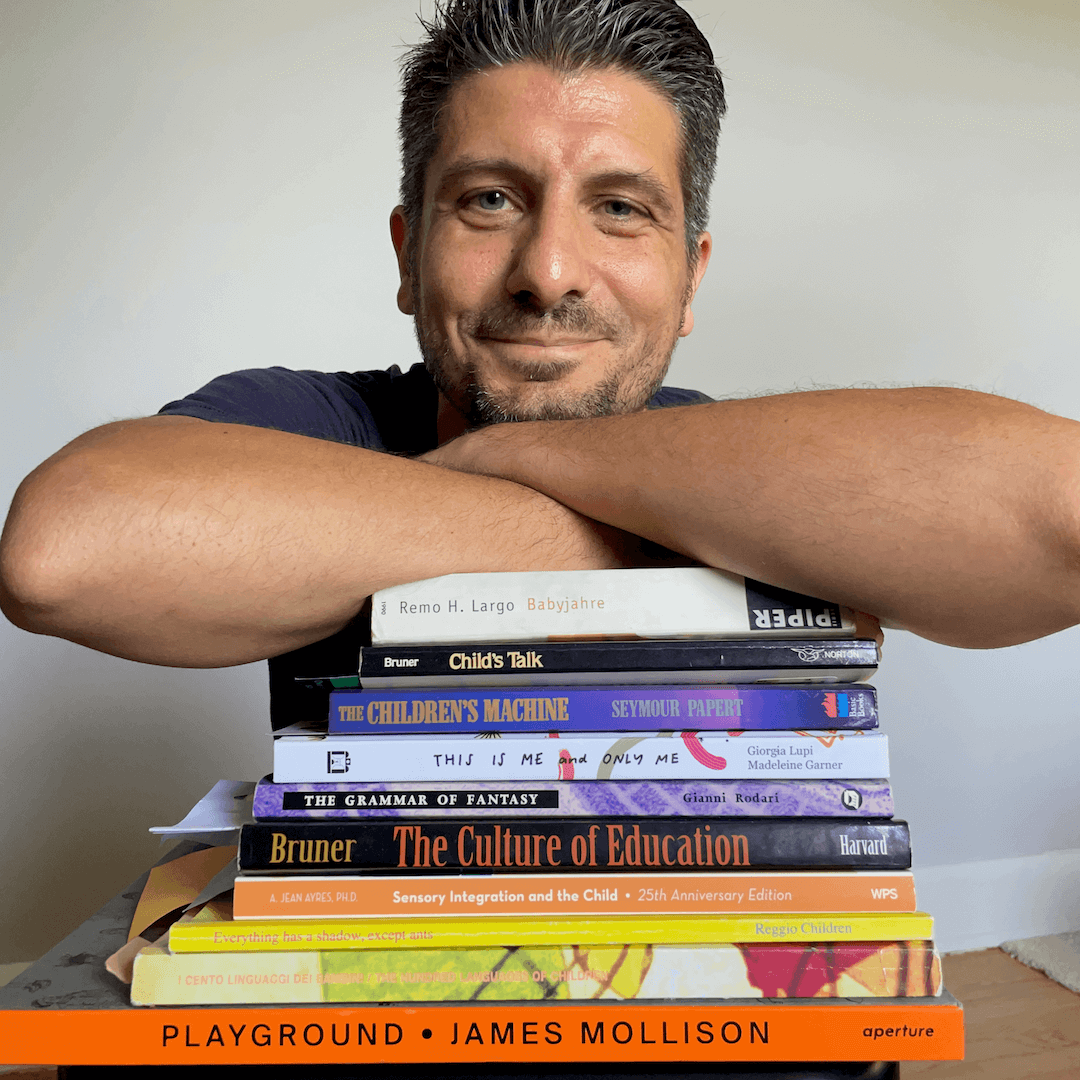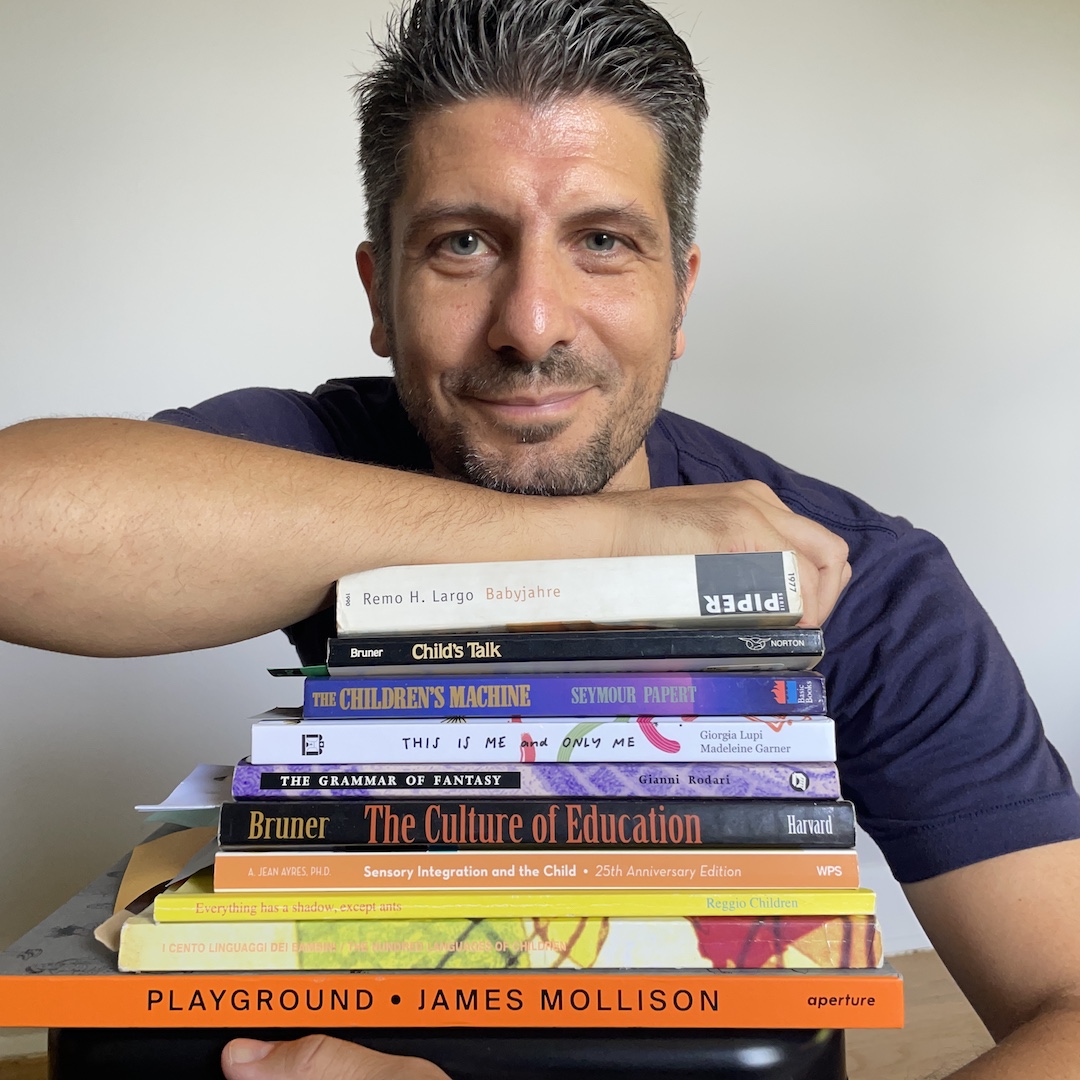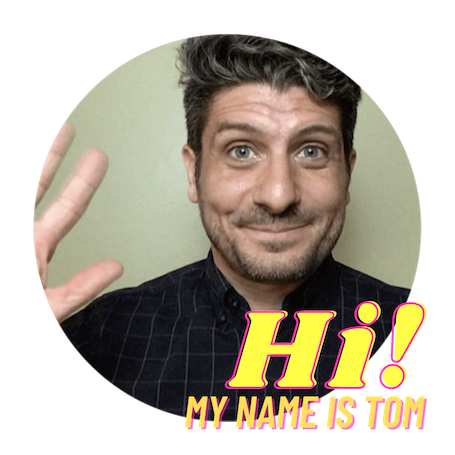This blog post shares the content of my monthly newsletter and conversations on LinkedIn with my network of early childhood education professionals.
As an Amazon Associate, I get commissions for purchases made through links in this post.
2024 Summer Reading List for Early Childhood Educators
I need young educators to believe in children and trust them on their natural journey to “learn how to learn.” I need young educators to read old books! And a few amazing new ones.
Skip the article and go to My 2024 ECE Summer Reading List

Looking at my desk, I have a 9:1 reading ratio: I read (or reread or browse) at least nine old books for every new one I read. Why? Because I need motivation and joy.
Most (not all) new books about early childhood are about something other than children. They are about the adults who surround children.
They point out how to solve problems quickly without analyzing or explaining them thoroughly, highlight dramatic data about development but encourage the reader to intervene “over and above” the child rather than “with” the child, and ultimately present children as incomplete humans who need to be fixed.
Despite some outdated content, I like to read some selected older ECE literature (from the 1970s, 1980s, and 1990s) because it believes in children and spreads an enthusiastic trust in childhood.
I need that.
I need young educators to believe in children and trust them on their natural journey to “learn how to learn.” I need young educators to read old books! And a few amazing new ones.
Enjoy my 2024 ECE Summer Reading List!
2024 Summer Reading List for Early Childhood Educators
Click on each title to read a few lines about my choice
The (amazing) New One
1. This is Me and Only Me (2024) by Giorgia Lupi and Madeleine Garner (Amazon)
Nine Amazing Old Books You Should Read or Read Again (and Again)
2. The Hundred Languages of Children (2005, first edition: 1996) by Sergio Spiaggiari and Reggio Children (Amazon | Public Library)
3. Playground (2015) by James Mollison (Amazon | Public Library)
4. Sensory Integration and the Child (2008, first edition: 1979) by A. Jean Ayres (Amazon | Public Library)
5. The Culture of Education by Jerome Bruner (Amazon | Public Library)
6. The Grammar of Fantasy: An Introduction to the Art of Inventing Stories (1996, first edition: 1973) by Gianni Rodari (Amazon | Public Library)
7. Babyjahre (1995, German edition) by Remo H. Largo (Amazon | Public Library)
8. Child’s Talk: Learning to Use Language (1985, first edition: 1983), by Jerome Bruner (Amazon | Public Library)
9. The Children’s Machine: Rethinking School in the Age of Computer (1993), by Seymour Papert (Amazon | Public Library)
10. Everything Has a Shadow, Except Ants (1999, first edition: 1990) by Reggio Children (Amazon | Public Library)
1. This is Me and Only Me by Giorgia Lupi and Madeleine Garner, Mantova, Corraini, 2024 (Amazon)
This is the best book I know about acknowledging every child’s identity, self-awareness, and belonging.
You can read it in 10 minutes, drop it, and go out to “read” the children. Then you come back, pick it up, browse it, and understand how to appreciate every child’s way of approaching the world, themselves, the community, and independent learning.
2. The Hundred Languages of Children by Sergio Spiaggiari and Reggio Children, Reggio Emilia, Reggio Children, 2005 (1996) (Amazon | Public Library)
This is the manual, the cornerstone, the foundation book for understanding child-centered pedagogy and documentation.
It’s the 1996 catalog exhibition (and conference) edition, the most complete and exhaustive of all the Reggio Children books published under the same title. It contains the transcript of a brilliant speech by Jerome Bruner about the “Located Child,” which I always use to explain to school directors, superintendents, and early childhood professionals that every place on the planet is a good place for opening a Reggio Emilia center or school.
3. Playground by James Mollison, New York, Aperture Foundation, 2015 (Amazon | Public Library)
Recently, I’ve been selling many workshops and PDs about “Learning Outdoors.” This photographic book is the perfect tool to explore what children worldwide do when outside the classroom. Even if the author portrays mostly schoolyards of higher grades than preschools, he captures hundreds of perfect childhood moments to learn from and ask ourselves: “Why do most of our schools and centers’ outdoor spaces look like an outdoor version of what’s inside, with the same goals, rules, and rituals?” So, what do children really need out there?
4. Sensory Integration and the Child by A. Jean Ayres, Los Angeles, Western Psychological Services, 2008 (1979) (Amazon | Public Library)
This fantastic book teaches you how to approach children’s sensory responses without judgment, improvised diagnoses, or playing hobby OT.
It conveys an incredible passion for understanding sensory systems and respectfully collaborating with children at their current stage of development. It contains mind-blowing sentences like this one: “If the child’s relationship to the earth is not secure, then all other relationships fail to develop optimally.”
5. The Culture of Education by Jerome Bruner, Cambridge, Mass., Harvard University Press, 1996 (Amazon | Public Library)
I haven’t read this book yet, but I always wanted to, and I will accomplish this wish this summer. The conversation about “culture” in early childhood education will soon become significant and vital in every school and center. In the US, it will take a lot of time, space, and energy among educators and faculty conversations, likely more than anywhere else. If you are a preschool director, ECE leader, manager, or administrator, this book (I already browsed it) is a sensational introduction to “culture” and the failures of education systems around it. I love the approach of this book: Jerome Bruner is always hopeful and purposeful. There is no anger in this book. We need to approach “culture” wisely, neither furiously nor violently.
6. The Grammar of Fantasy: An Introduction to the Art of Inventing Stories by Gianni Rodari, New York, Teachers & Writers Collaborative, 1996 (1973) (Amazon | Public Library)
In 1973, Italian children’s book author and educator Gianni Rodari wrote this extraordinary book about children’s imagination. Fifty or more years later, is children’s imagination still there? Is it hidden? Did children lose it? Perhaps it’s been absorbed by overstimulation, devices, and screens.
In my opinion, imagination is the most distinctive, natural possession (superpower) of young humans. There is too much noise and control around them, and today’s children struggle to find it. This book, which we hope will be republished in 2025 in a brand new, stunning illustrated version, reminds you to believe in children and listen to their fantastic reasoning, playing, and inventing stories on their ambitious, autonomous journey to understand and learn everything.
7. Babyjahre (German Edition) by Remo H. Largo, Munich, Piper, 1999 (1995) (Amazon | Public Library)
I suppose I have a thing for Swiss pediatricians. During my workshops and PDs, I love to quote Dr. Fritz Stirnimann (1877-1947) from Luzern (Switzerland), who pioneered infant and toddler observation in search of innate competence. Here I have a book by another, extraordinary Swiss pediatrician that, I’m sorry, doesn’t have an English translation. However, given that machines can do this job for you today, I mean translating from foreign languages, this book approaches the biological development of humans from birth to 3 years with a simplicity and clarity that has no comparison.
Why did I put this book here? Because I think of it every time I bump into frustrating and frankly absurd questions on young parents’ Facebook groups I follow for professional and research reasons. People who work and live with young children (0-3), all the right answers are in this one book!
8. Child’s Talk: Learning to Use Language, by Jerome Bruner, New York, W. W. Norton, 1985 (1983) (Amazon | Public Library)
Another of my PDs that is catching the eye of many preschool administrators is “Early Literacy: The Art of Inventing Stories.” This book (and my PD) wants to capture the attention of those who teach literacy to young children as if it was an add-on skill to learn from scratch and guide them through discovering how much literacy is inside young humans before they arrive in their classroom. You don’t want teaching language and literacy to become the new force-feeding.
9. The Children’s Machine: Rethinking School in the Age of Computer by Seymour Papert, New York, BasicBooks, 1993 (Amazon | Public Library)
I will read this book this summer. I bumped into it while researching the ‘science of learning’ as a counterpart of the ‘science of teaching,’ familiarly known as “didactics.” In this book, the content of which is very far from what you expect by reading the title, Seymour Papert introduces the ‘science of learning’ as “mathetics,” a term coined by a pedagogue, John Amos Comenius (1592-1670), from Bohemia.
As an advocate of children’s autonomous learning, I am curious to find more answers in this book about whether “mathetics” can become part of my lingo and workshops.
10. Everything Has a Shadow, Except Ants by Reggio Children, Reggio Emilia, Reggio Children, 1999 (1990) (Amazon | Public Library)
Discovery is a massive topic in early childhood education at a time when the internet, our phones, and Alexa or Siri already have all the answers. Children have the right to wonder and still have an innate drive for autonomous discoveries. This astounding documentation book shows you why you don’t need to know or explain everything to children with the help of your devices. It is still priceless for them to have space and freedom to discover things independently.


